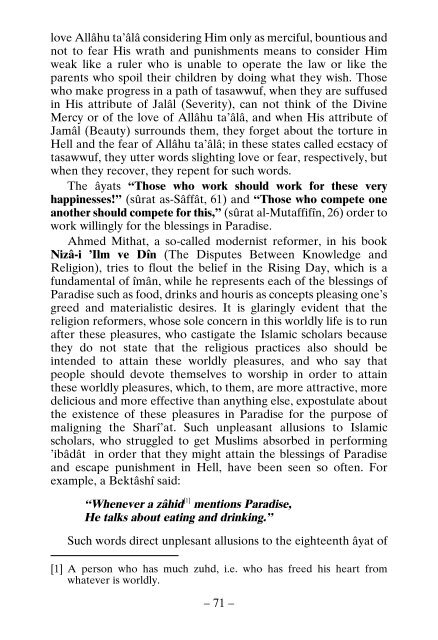Islams Reformers
The bigotry of the religion reformers or bigots of science who surfaced lately to blame all previous scholars, basic fundamental beliefs or practices
The bigotry of the religion reformers or bigots of science who surfaced lately to blame all previous scholars, basic fundamental beliefs or practices
You also want an ePaper? Increase the reach of your titles
YUMPU automatically turns print PDFs into web optimized ePapers that Google loves.
love Allâhu ta’âlâ considering Him only as merciful, bountious and<br />
not to fear His wrath and punishments means to consider Him<br />
weak like a ruler who is unable to operate the law or like the<br />
parents who spoil their children by doing what they wish. Those<br />
who make progress in a path of tasawwuf, when they are suffused<br />
in His attribute of Jalâl (Severity), can not think of the Divine<br />
Mercy or of the love of Allâhu ta’âlâ, and when His attribute of<br />
Jamâl (Beauty) surrounds them, they forget about the torture in<br />
Hell and the fear of Allâhu ta’âlâ; in these states called ecstacy of<br />
tasawwuf, they utter words slighting love or fear, respectively, but<br />
when they recover, they repent for such words.<br />
The âyats “Those who work should work for these very<br />
happinesses!” (sûrat as-Sâffât, 61) and “Those who compete one<br />
another should compete for this,” (sûrat al-Mutaffifîn, 26) order to<br />
work willingly for the blessings in Paradise.<br />
Ahmed Mithat, a so-called modernist reformer, in his book<br />
Nizâ-i ’Ilm ve Dîn (The Disputes Between Knowledge and<br />
Religion), tries to flout the belief in the Rising Day, which is a<br />
fundamental of îmân, while he represents each of the blessings of<br />
Paradise such as food, drinks and houris as concepts pleasing one’s<br />
greed and materialistic desires. It is glaringly evident that the<br />
religion reformers, whose sole concern in this worldly life is to run<br />
after these pleasures, who castigate the Islamic scholars because<br />
they do not state that the religious practices also should be<br />
intended to attain these worldly pleasures, and who say that<br />
people should devote themselves to worship in order to attain<br />
these worldly pleasures, which, to them, are more attractive, more<br />
delicious and more effective than anything else, expostulate about<br />
the existence of these pleasures in Paradise for the purpose of<br />
maligning the Sharî’at. Such unpleasant allusions to Islamic<br />
scholars, who struggled to get Muslims absorbed in performing<br />
’ibâdât in order that they might attain the blessings of Paradise<br />
and escape punishment in Hell, have been seen so often. For<br />
example, a Bektâshî said:<br />
“Whenever a zâhid [1] mentions Paradise,<br />
He talks about eating and drinking.”<br />
Such words direct unplesant allusions to the eighteenth âyat of<br />
[1] A person who has much zuhd, i.e. who has freed his heart from<br />
whatever is worldly.<br />
– 71 –

















